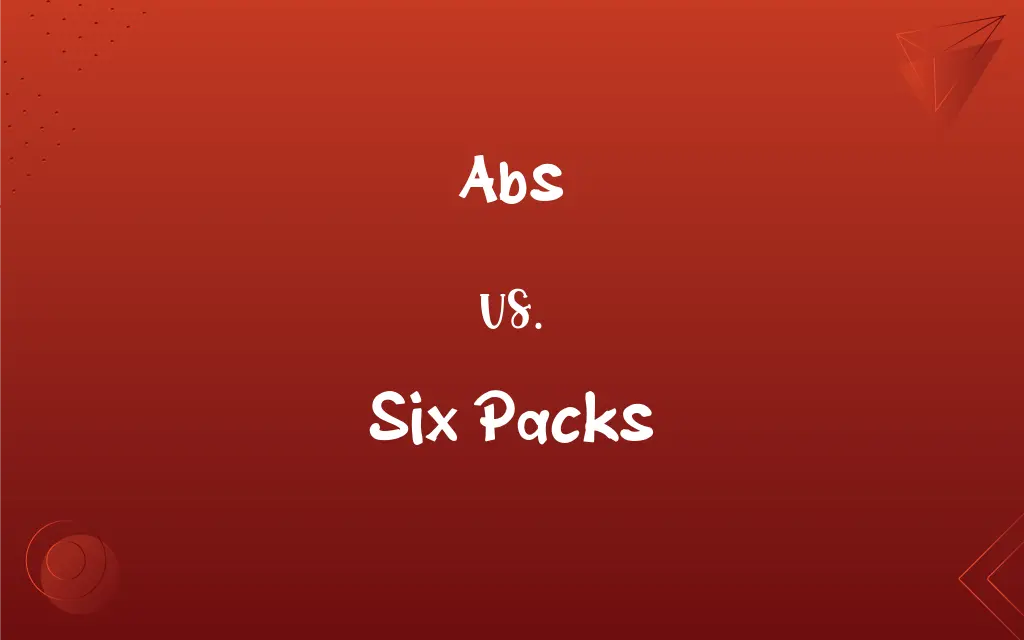Abs vs. Six Packs: What's the Difference?
Edited by Aimie Carlson || By Harlon Moss || Published on December 10, 2023
"Abs" refers to the abdominal muscles as a whole, while "six packs" specifically denotes a visibly defined, six-segment abdominal muscle group.

Key Differences
Abs, short for abdominal muscles, include the entire muscle group in the abdomen. On the other hand, six packs specifically refer to abs with visible segmentation, usually six distinct muscle bulges.
Everyone has abs, as they are a critical muscle group for core strength and stability. A six pack, however, is a physical manifestation of highly developed and visible abs.
The visibility of abs depends on overall body fat percentage and muscle development. While, a six pack becomes visible under lower body fat conditions with well-developed abdominal muscles.
Abs play a crucial role in movement and support of the upper body. Whereas, six packs are often associated with fitness levels, bodybuilding, and aesthetic physical conditioning.
The development of abs is essential for functional strength and body support. Achieving a six pack is often a goal in fitness regimes focused on aesthetic muscle definition.
ADVERTISEMENT
Comparison Chart
Definition
General term for abdominal muscles
Specifically defined, visible abs
Visibility
Not always visible
Highly visible with defined segments
Function
Provide core strength and stability
Indicate low body fat and high muscle tone
Universality
Present in all individuals
Visible in individuals with specific fitness
Fitness Association
Essential for overall strength
Often associated with intense workouts
ADVERTISEMENT
Abs and Six Packs Definitions
Abs
Abs are the muscles located in the abdomen.
Her workout routine focuses on strengthening her abs.
Six Packs
Six packs are visibly segmented abdominal muscles.
He achieved his six packs after months of training.
Abs
Abs are key in movements like bending and lifting.
His abs get a good workout from yoga.
Six Packs
Six packs require targeted abdominal workouts.
He does planks daily to maintain his six packs.
Abs
Abs assist in core stability and posture.
Good abs are crucial for a strong back.
Six Packs
Six packs symbolize peak physical conditioning.
The athlete's six packs were visible during the competition.
Abs
Abs include various muscles like the rectus abdominis.
Pilates exercises target deep abs muscles.
Six Packs
Six packs are a sign of low body fat and muscle definition.
Her diet and exercise plan was focused on getting a six packs.
Abs
Abs can be toned with exercises like crunches.
She does daily crunches to tone her abs.
Six Packs
Six packs are often a goal in fitness and bodybuilding.
Achieving a six packs is a common goal at the gym.
Abs
Abbreviation of abstract
Six Packs
Six units of a commodity, especially six cans or bottles of a beverage, such as beer, sold in a pack.
Abs
(informal) The abdominal muscles. ab
Six Packs
The contents of a six-pack.
Abs
Acronym of absolute temperature
Six Packs
(Informal) The six mounds of muscle, arranged in two columns of three, that are visible on the abdomen of a person with low body fat and high muscular definition.
Abs
(mathematics) absolute value function
Six Packs
Plural of six-pack
Abs
The abductor muscles of the stomach; - a contraction used by body-building and health enthusiasts. Used similarly to pecs and delts.
FAQs
What are abs?
Abs refer to the abdominal muscles located in the midsection of the body.
Is having a six-pack a sign of good health?
Not necessarily. While it indicates low body fat, it doesn't always equate to overall health.
How do you train your abs?
Abs can be trained with exercises like crunches, planks, and leg raises.
What is a six-pack?
A six-pack is a term used to describe well-defined abdominal muscles, making them visibly segmented into six parts.
Can everyone develop a six-pack?
Yes, with proper diet and exercise, most people can develop a six-pack, though genetics also play a role in how they appear.
Do abs only include the 'six-pack' muscles?
No, abs include several muscles, but the 'six-pack' refers specifically to the rectus abdominis.
Can you see abs at any body fat percentage?
Generally, abs become visible at a lower body fat percentage, often below 15% for men and 20% for women.
Is it safe to train abs every day?
Like other muscles, abs need rest to recover, so daily training is not recommended.
Can you get a six-pack just by doing sit-ups?
Sit-ups alone are not enough; a combination of core exercises and fat reduction is needed.
How important is diet in getting a six-pack?
Diet is crucial, as reducing body fat is necessary to make the abs visible.
How long does it take to get a six-pack?
It varies depending on starting body fat percentage, diet, and exercise regimen.
Do genetics affect abs development?
Genetics play a role in the shape and alignment of abs muscles.
Is it easier for some people to get a six-pack?
Yes, factors like genetics, body type, and metabolism can make it easier for some.
Does age affect the ability to get a six-pack?
Age can impact metabolism and muscle mass, but a six-pack is achievable at any age with the right approach.
Does everyone have the same abs structure?
No, the shape and alignment of abs vary among individuals due to genetics.
Do abs exercises burn belly fat?
Abs exercises strengthen the muscles but don't specifically burn belly fat; total body fat reduction is required.
Are there any risks in overtraining abs?
Yes, overtraining can lead to muscle strain and imbalance.
Can you train abs at home?
Yes, many effective abs exercises can be done at home without equipment.
Can women develop a six-pack?
Yes, women can develop a six-pack with appropriate training and diet.
Are six-packs more common in certain sports?
Yes, sports that require core strength and low body fat, like gymnastics or swimming, often have athletes with six-packs.
About Author
Written by
Harlon MossHarlon is a seasoned quality moderator and accomplished content writer for Difference Wiki. An alumnus of the prestigious University of California, he earned his degree in Computer Science. Leveraging his academic background, Harlon brings a meticulous and informed perspective to his work, ensuring content accuracy and excellence.
Edited by
Aimie CarlsonAimie Carlson, holding a master's degree in English literature, is a fervent English language enthusiast. She lends her writing talents to Difference Wiki, a prominent website that specializes in comparisons, offering readers insightful analyses that both captivate and inform.








































































